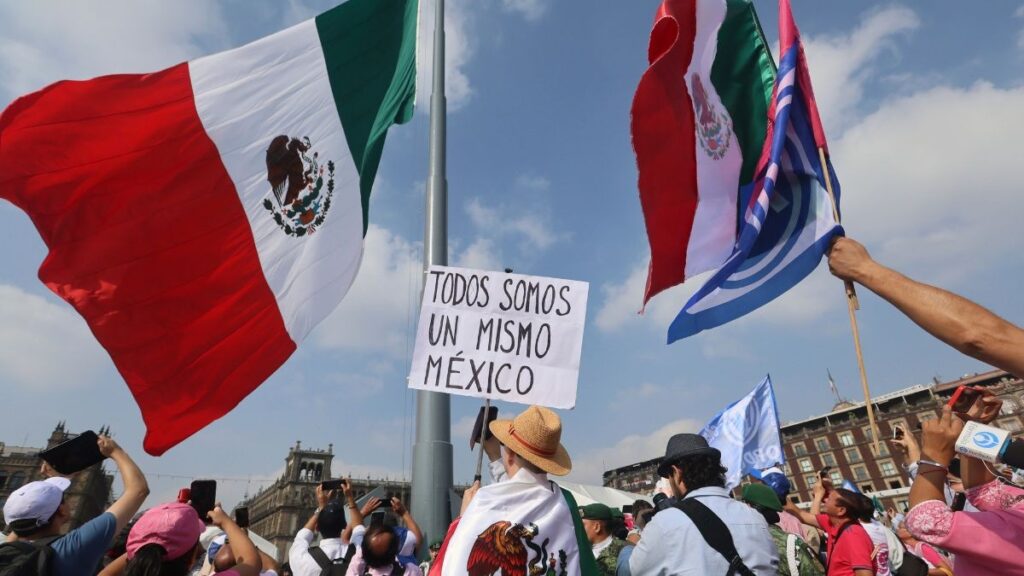A person holds a sign that reads “We are all the same Mexico” during an opposition rally called to encourage voting ahead of the June 2 presidential election, in the main square, Zocalo, in Mexico City, May 19, 2024. The Associated Press
As Mexico prepares for its biggest elections in history, political violence is casting a shadow over passionate campaigning. Dozens of candidates have been killed ahead of the June 2 election, a tragic reflection of the country's deep-rooted problems with organized crime and political instability.
At least 36 candidates have been reported killed since June last year. The New York TimesThis marks a significant increase in political violence compared to past election cycles. For example, in the 2021 election cycle, at least 32 candidates were killed as voters cast their ballots in more than 19,900 local elections.
Risk Consulting Integria A total of 560 cases of violence against candidates were recorded during this election period, surpassing the previous record of 389 cases in the last presidential election. Data CivicaHuman rights groups have tracked at least 145 political figures killed by organized crime this year.
What are the reasons behind political violence?
The surge in violence is largely due to a split between local crime groups and larger organized crime syndicates. These rival gangs are locked in fierce battles for power and territory, often bribing or blackmailing authorities to ensure control over their communities.
The trend is particularly acute in states such as Chiapas, Guerrero and Michoacan, where criminal groups are vying for dominance.
The violence has primarily targeted local elections, which criminal gangs see as an opportunity to seize power. In May alone, two mayoral candidates were found dead in Tamaulipas, and gunmen killed six people at a political rally in Chiapas, including another mayoral candidate. These attacks are known to disrupt the democratic process and sow fear among candidates and voters alike.
What did Obrador do about this?
Mexico's current President Andrés Manuel López Obrador's “hugs, not guns” policy emphasizes addressing the social roots of violence, but has faced criticism for allowing drug cartels to expand their influence.
Despite promises to ease the violence, murder rates remain high and organized crime continues to wield great influence, with critics arguing that the government's reluctance to directly confront criminal groups is making the situation worse.
clock9 killed in Mexican presidential election stage collapse
Activists and analysts have criticized President Lopez Obrador, known as AMLO, for trying to reduce the official number of forcibly disappeared people in Mexico ahead of the election. The ongoing violence and the government's response have become central issues in the campaign, influencing voter perceptions and the political climate.
The size and stakes of Mexico's elections
More than 20,700 positions will be filled at the federal and local levels in the June 2 election, including 500 seats in the House of Representatives and 128 seats in the Senate. This surge in voter turnout represents an increase of about 11 million voters compared to the last presidential election in 2018.
With Obrador's term coming to an end, the presidential election is attracting a lot of attention. Former Mexico City mayor Claudia Sheinbaum is head of the Morena party and aims to continue AMLO's legacy. Her main rival, Xochitl Gálvez, is a former senator and businesswoman from the conservative coalition Strength and Heart for Mexico. This election could see Mexico elect its first female president, a historic milestone for the country.
Mexico's National Electoral Institute (INE) is overseeing the elections, with voting taking place in 170,000 polling stations across the country. Mexicans living abroad can vote online, by mail, or in person at their consulate. Early voting is available for people with disabilities from May 6 to May 20. Polling stations open at 8 am and close at 6 pm, with the INE providing real-time statistics. A second count from June 5 to 8 will determine the results.
See alsoWho is Claudia Scheinbaum, the environmental activist who is likely to become Mexico's first female president?
The presidential election is dominated by two major coalitions: the conservative “Strength and Heart of Mexico” and the leftist “Continue to Make History” coalition, led by Sheinbaum and Gálvez, respectively. Another notable candidate is Jorge Álvarez Maínez of the Citizens' Movement, but his chances of winning are considered slim.
What is the central issue?
Security, social security and corruption are the main concerns of voters, and the election is also seen as a referendum on AMLO's presidency.
While Scheinbaum has pledged to continue the policies, Galvez has criticized Obrador's approach to crime and vowed to take a tougher stance. “Galvez criticized Obrador for saying he would deal with crime with 'hugs, not bullets,'” he wrote, highlighting a core part of his campaign.
But Obrador remains one of the world's most popular leaders, with an approval rating that has never dipped below 60 percent. His presidency has focused on tackling poverty and expanding the military's role in public security and infrastructure projects.
But critics say it has failed to significantly reduce crime or address the problem of missing persons, which has worsened since the “war on drugs” began in 2006.
AMLO cannot run for a second term due to a ban on reelection in Mexico's constitution, a legacy of the Mexican Revolution and the long rule of dictator Porfirio Diaz.
See alsoDay Zero looming? Mexico City could run out of water within a month
As Mexico approaches this crucial election, the loss of life and the prevalence of organized crime highlight the serious challenges facing the country.
Information provided by the institution
Find us on YouTube
subscribe

